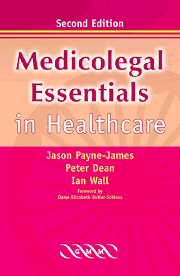Book contents
- Frontmatter
- Contents
- Contributors
- Editors' note for the first edition
- Editors' note for the second edition
- Foreword
- Table of statutes
- Table of cases
- 1 Legal institutions and the legal process
- 2 Human rights and healthcare professionals
- 3 Medical ethics and the forensic physician
- 4 Confidentiality
- 5 Consent to medical treatment
- 6 Professional bodies and discipline
- 7 Complaints in the National Health Service
- 8 The Mental Health Act (England and Wales)
- 9 Death certification and the role of the coroner
- 10 Tissues and organs
- 11 Organ donation
- 12 Living wills
- 13 Euthanasia and end-of-life decision-making
- 14 Abortion and reproductive health
- 15 The Children Act 1989
- 16 Clinical negligence
- 17 Legislation for medicines and product liability
- 18 Clinical trials: ethical, legal and practical considerations
- 19 Medicolegal implications of blood-borne viruses
- 20 Healthcare professionals in court – professional and expert witnesses
- Index
5 - Consent to medical treatment
Published online by Cambridge University Press: 12 January 2010
- Frontmatter
- Contents
- Contributors
- Editors' note for the first edition
- Editors' note for the second edition
- Foreword
- Table of statutes
- Table of cases
- 1 Legal institutions and the legal process
- 2 Human rights and healthcare professionals
- 3 Medical ethics and the forensic physician
- 4 Confidentiality
- 5 Consent to medical treatment
- 6 Professional bodies and discipline
- 7 Complaints in the National Health Service
- 8 The Mental Health Act (England and Wales)
- 9 Death certification and the role of the coroner
- 10 Tissues and organs
- 11 Organ donation
- 12 Living wills
- 13 Euthanasia and end-of-life decision-making
- 14 Abortion and reproductive health
- 15 The Children Act 1989
- 16 Clinical negligence
- 17 Legislation for medicines and product liability
- 18 Clinical trials: ethical, legal and practical considerations
- 19 Medicolegal implications of blood-borne viruses
- 20 Healthcare professionals in court – professional and expert witnesses
- Index
Summary
Non-consensual physical contact forms the basis of the criminal offence of assault and the civil wrong of battery; laws which affirm principles that seek to ensure preservation of individual integrity and the inviolability of the body.
In addition to legitimising otherwise illegal acts of contact, consent, as a reflection of choice, lies behind ethical notions of individual autonomy and self-determination.
A respect for these principles should form the basis of good medical practise, rather than outdated ideas of medical paternalism exemplified by the maxim ‘doctor knows best’, which often resulted in the relegation of therapeutic consent to paper exercises.
VALID CONSENT
Whether an individual is able to give consent, and whether indeed such consent is ‘true’ or legally valid is dependant on three factors. The individual must have sufficient capacity, they must possess sufficient understanding or knowledge of the proposed intervention, and their agreement to undergo the proposed treatment must be voluntary, that is, it must be freely given and not tainted by any degree of coercion or undue influence, either from the healthcare professional or family members.
CAPACITY
There is a legal presumption that any person over the age of 18 who is not suffering from a mental incapacity (infra) is capable of giving consent for, or refusing, medical treatment, unless there is evidence to the contrary.
- Type
- Chapter
- Information
- Medicolegal Essentials in Healthcare , pp. 39 - 50Publisher: Cambridge University PressPrint publication year: 2004



